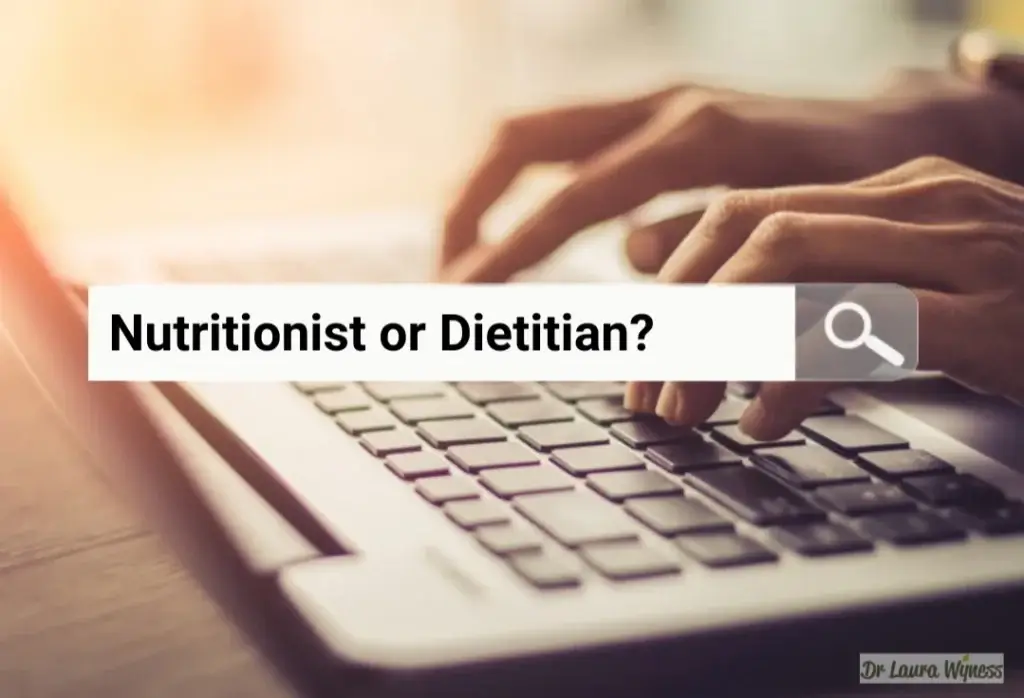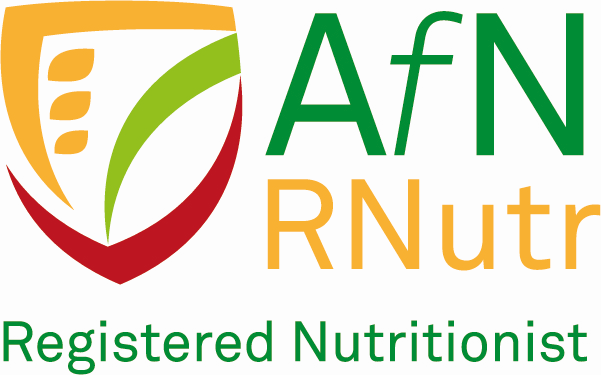Both Dietitians and Registered Nutritionists are qualified to give general dietary advice to healthy populations, for example to help prevent people becoming ill and support healthy eating. However, only Dietitians can treat patients with nutrition advice (i.e. providing nutrition support to people with a chronic or acute condition).
In the UK, due to a lack of regulation, anyone can call themselves a ‘Nutritionist’. As a result, there are many ‘nutritionists’, ‘nutrition advisors’, ‘nutritional therapists’ and ‘diet experts’ providing advice and information on nutrition. To help protect and benefit the public, the Association for Nutrition (AfN) is the independent regulator for AfN Registered Nutritionists.

AfN Registered Nutritionist
The AfN hold the UK Voluntary Register of Nutritionists (UKVRN). For a Nutritionist to be on this register they need to meet rigorously applied training, competence and professional practice criteria. Its purpose is to protect the public and assure the credibility of nutrition as a responsible profession.
AfN Registered Nutritionists are qualified to give evidence-based information and advice about food and healthy eating, including for disease prevention.
The easiest way to check for nutritional information you can trust is to look out for the initials ANutr or RNutr. A new nutrition graduate with less than 3 years’ experience can register as a Registered Associate Nutritionist and use ‘ANutr’ after their name. Once an individual has gained professional experience and can demonstrate sustained evidence-based application of their knowledge in professional practice they can register as a Registered Nutritionist (RNutr) with AfN.

All Registered Nutritionists have a minimum of degree-level nutrition science or one year postgraduate course accredited by AfN. Some like myself may also have a PhD in nutrition too. RNutr’s will also have approximately 3 or more years of professional experience, have committed to provide only evidence-based information and abide by a strict code of ethics regarding the advice they give out about nutrition.
It’s also worth noting that not all ‘Registered Nutritionists’ are registered with AfN. Some may be registered with another organisation. Look for the AfN Registration logo, the letters ANutr or RNutr after the Nutritionists name or search for an individual in the AfN Register here.
You can also search the AfN register for Registrants offering specific services, such as those who undertake scientific research on a consultancy basis, those who provide one-to-one consultations or who provide nutrition communications or support to food brands.
Nutritional Therapist or Registered Nutritionist with BANT
Some Nutritional Therapists also use the title Registered Nutritionist if they are registered with BANT (the British Association of Nutrition and Lifestyle Medicine). You can check whether they are a BANT Registered Nutritionist in the directory here.
Nutritional Therapists or Registered Nutritionists with BANT work within the area of complementary and alternative therapies. They use a variety of tools to assess and identify potential nutritional imbalances and understand how these may contribute to an individual’s symptoms and health concerns. Treatment methods can include detoxing, food avoidance and use of supplements not approved by the NHS and commercial allergy testing not NHS approved.
Education can vary. Their training may be a distance learning course, online or short-course, a diploma or a 3-year undergraduate degree in nutrition therapy accredited by the Nutritional Therapy Council or Complementary and Natural Healthcare Council (CNHC). The Institute of Optimum Nutrition (ION) awards a ‘Foundation degree’ to those completing courses to a sufficient level. This however, is not equivalent to a University degree.
Nutritional Therapists can register with the Complementary and Natural Healthcare Council, although this is not compulsory.
Dietitian
The title of Dietitian is legally protected in the UK and all dietitians have completed one of the Health & Care Professions Council approved degree programmes and will be on the HCPC register.
Dietitians can work with patients to manage or treat their medical condition or provide therapeutic diets. They can work in clinical settings such as NHS or private practice, food industry, research, media and communication, government, charity or in the community. They work with both healthy and sick people. Dietitians sometimes specialise in a particular area such as gut health, cancer, eating disorders or food allergies and intolerances.
As an AfN Registered Nutritionist, I often refer individuals to a Dietitian, if the support they need is outside my scope of practice, or if I feel they would benefit more from a Dietitian’s expertise. One of the reasons I offer a free exploratory call to individuals who are looking for nutrition advice is to determine if I can provide them with the support they need. For example, for individuals with specific gut health issues, or struggling with endometriosis, Dietitian Laura Vincent may be able to help, or for support with an eating disorder Priya Tew has expertise in this area.
The BDA freelance directory is a useful tool to search for a Dietitian offering consultations





